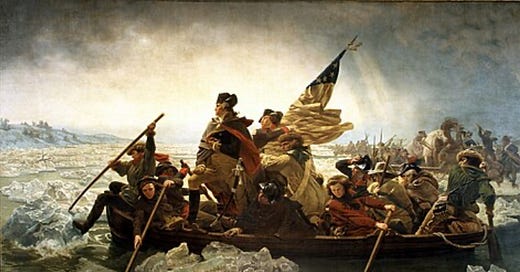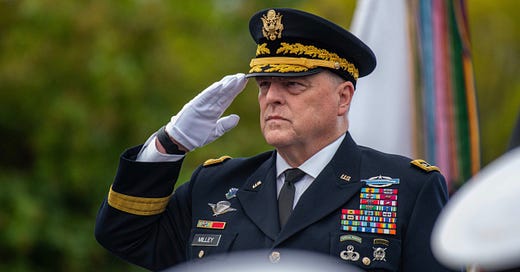
The American canon is comprised of immortal words from ordinary people rising in defence of freedom, liberty and equality.
What binds the words across our history is their incandescent moral clarity at great moments of testing. They endure and ring across the ages because, within them, is the epic story of the birth, rise and expansion of liberty in the United States.
There are no great speeches from the racists, Confederates, Klansmen, know nothings, lynch mobs, Bund or any of a dozen other lesser totalitarian movements that have sprung to life in America during our history. They have left behind rivers of blood, pain, suffering and oppression, but no great ideas or monuments to achievement.
The words that gave life to the Confederacy, Jim Crow and January 6 were poisonous and unworthy ones. They came from the lips and pens of America’s villains.
Today, these lies and poisonous words that seek division and disunity have found a home in the ideology of national conservatism and MAGA. Where are the places to look for guidance and resolve in this moment of testing — one in which a political party in America has abandoned the American experiment, which is rooted in the democracy of a constitutional republic?
Thomas Paine came up with a phrase that became a name. He was the first person to write the words “United States of America.” He invented it. It did not exist before he wrote it. The British Empire was the most powerful on Earth when the phrase “an empire upon which the sun never sets” was coined, not long before the American Revolution.
Sadly, today, most Americans know little about the revolution that remade the world. It was an audacious undertaking to say the least. Rick Atkinson, the superb historian and author of “The Liberation Trilogy,” which is perhaps the finest telling of America’s involvement in the European theater of the Second World War written this century, has begun his “The Revolution Trilogy.” The first book tells the story of the “shot heard around the world.” It tells the story of the American Revolution’s brutal first years, during which the “cause” was nearly finished. Morale was low, the army was ill-trained, poorly led, often shoeless and hungry. Congress was completely dysfunctional and the newly declared country was broke. The British Army was in pursuit when George Washington maneuvered his broken force to an encampment on the Pennsylvania side of the Delaware River. Less than six months had passed since the reading of the Declaration of Independence to expectant colonists in July. The Revolution was on the edge of being crushed. The situation seemed hopeless.
Thomas Paine wrote a series of 13 essays that he titled “The American Crisis.” They were signed with the pseudonym “Common Sense.” The United States was born in crisis, and has existed within the turmoil of humanity’s story for nearly 250 years. Nothing was preordained.
Then, like now, history was forged by courage and cowardice. There was no human behavior that wasn’t present at the birth of the United States, including all of the despicable ones on display within our current politics. Sometimes it helps to think about the ignominy and disgrace of people like Elise Stefanik, Lindsey Graham, Kevin McCarthy, Ted Cruz, Matt Schlapp, Josh Hawley, Marjorie Taylor Greene, Tucker Carlson, Lauren Boebert and a few hundred others in a broader context.
Thomas Paine addressed this phenomenon during the early hours of the American experiment. There has been no cure for expediency, timidity, careerism, ambition and selfishness in the intervening years. The language will be a bit archaic to the modern ear, but read it slowly below and see the wisdom. It is true that these years of chaos have had an unexpected blessing. Everyone has gotten a chance to show everybody exactly who they are. The technological realities of 2023 make it so much more vivid than what would have existed in Paine’s day, but the impulses and human nature are identical:
“Tis surprising to see how rapidly a panic will sometimes run through a country. All nations and ages have been subject to them. Britain has trembled like an ague at the report of a French fleet of flat-bottomed boats; and in the fourteenth [fifteenth] century the whole English army, after ravaging the kingdom of France, was driven back like men petrified with fear; and this brave exploit was performed by a few broken forces collected and headed by a woman, Joan of Arc. Would that heaven might inspire some Jersey maid to spirit up her countrymen, and save her fair fellow sufferers from ravage and ravishment!
Yet panics, in some cases, have their uses; they produce as much good as hurt. Their duration is always short; the mind soon grows through them, and acquires a firmer habit than before. But their peculiar advantage is, that they are the touchstones of sincerity and hypocrisy, and bring things and men to light, which might otherwise have lain forever undiscovered. In fact, they have the same effect on secret traitors, which an imaginary apparition would have upon a private murderer. They sift out the hidden thoughts of man, and hold them up in public to the world.”
No truer words. The ignominy of men like Trump and his enablers is novel only in that their crimes are unique to them. The character of the players and their wretchedness is timeless. During this first essay, Paine tells the story of a loyalist farmer and his daughter. The farmer says, “Well give me peace in my day!” Paine regards the man as an ungenerous parent and in a sentence lays down an American ethos about sacrifice that has held from that moment until recently. It is the unwritten agreement between the American generations that Donald Trump and his enablers have smashed only recently. “If there must be trouble, let it be in my day, that my child may have peace.”
Paine would likely have been astonished to learn that the American experiment, not only succeeded, but endured. One of his contemporaries, a French nobleman, the Marquis de Lafayette would later say that the spark of liberty that was lit in the new world would light the old. It did. Perhaps it would have been beyond Paine’s imagination that one day American, Canadian and British troops would storm French beaches together against the greatest tyranny that the world has ever known. The American graves that lie above those beaches all face home towards land, across an ocean, to which none of them returned in a fight for human freedom against human slavery. He would have understood the cause, and he would have understood the sacrifice. He would not have understood the lassitude of their grandchildren and a generation of privileged Americans who would surrender a birthright paid in blood to a Queens hustler and a cast of paw-licking ne’er-do-wells who want to establish a tyranny in place of the rule of law.
He would have understood the fear of the moment because fear was present at America’s beginning. It was everywhere when the cause seemed lost.
Paine addressed the moment that confronted our new nation and the pervasive fear of the people, army and Congress when all seemed lost in late 1776. “I thank God that I fear not. I see no real cause for fear. I know our situation well and can see the way out of it.”
America has always burned with optimism. The promise of tomorrow has been fundamental to the development of the national character forged over 250 years of unequal progress towards the achievement of the noble ideals of July 1776. Nations that can be unraveled by despair can be redeemed by hope and defiance. They can be reinvigorated by a spark and an idea. In the moments where all seems lost, there comes a clarifying light. There are words that light the way and steady the nerves, calm the soul and clarify great purposes and causes. There are words that birth grit, resolve and a brutal determination to prevail against impossible odds.
These words were published on December 19, 1776, as the bedraggled Continental Army, a rabble of untrained farmers — most of whom were nearing the end of their enlistments — huddled at the abyss of defeat in Pennsylvania. The frigid and ice-filled waters of the Delaware River were all that was keeping George Washington and his army alive.
He ordered the following be read out loud to the Continental Army on December 23, 1776. These are the words — as much as the Declaration of Independence — that gave birth to America. These are the words that saved America at twilight before our journey had even begun. The country, if it could be called that, was not yet six months old.
“THESE are the times that try men's souls. The summer soldier and the sunshine patriot will, in this crisis, shrink from the service of their country; but he that stands by it now, deserves the love and thanks of man and woman. Tyranny, like hell, is not easily conquered; yet we have this consolation with us, that the harder the conflict, the more glorious the triumph. What we obtain too cheap, we esteem too lightly: it is dearness only that gives every thing its value. Heaven knows how to put a proper price upon its goods; and it would be strange indeed if so celestial an article as FREEDOM should not be highly rated.”
We live in a time in which the celestial has become common, cheap and corrupted by the lassitude of a people who have become estranged from the virtues that deserve celebration, remembrance and honor in a republic. That has no bearing on the inherent truths that Paine wrote about in his day, and are essential for our time to conquer the threat ahead.
Freedom and a shared fidelity to the US Constitution was the common ground. It has been breached, and there is no place to meet in the middle. The threat comes from the MAGA movement that controls the institutional structures of the 169-year-old GOP lock, stock and barrel. The threat comes from a disgraced former president who tried to burn down the republic because he was rejected in an election.
Soon, Trump will be the Republican nominee for president again. He will be supported by a fanatical and belligerent minority that bloodied the peaceful transition of power invented by George Washington, John Adams, Thomas Jefferson, Alexander Hamilton and James Madison that endured for 226 years. That is until Trump, Josh Hawley, Ted Cruz, Ginni Thomas, Rudy Giuliani, Boris Epshteyn, Steve Bannon and a few thousand fellow travellers and co-conspiracists attacked the United States of America on January 6, 2021. That attack was the greatest crime against the American people since secession, and that includes the catastrophic assassinations of some of America’s greatest, noblest, wisest and promising leaders.
Again, Paine’s words from 1776 reach out to our own troubled times, and the nitwittery that flows freely now as it did then.
“There are cases which cannot be overdone by language, and this is one. There are persons, too, who see not the full extent of the evil which threatens them; they solace themselves with hopes that the enemy, if he succeed, will be merciful. It is the madness of folly, to expect mercy from those who have refused to do justice; and even mercy, where conquest is the object, is only a trick of war; the cunning of the fox is as murderous as the violence of the wolf, and we ought to guard equally against both.”
All Americans who love freedom should feel the deepest contempt for the hustlers, charlatans, cynics and opportunists who have attacked it in recent years under the MAGA banner. All American patriots should have a special contempt for the weakness and cynicism of the politicians who so easily, effortlessly and willingly got on their knees to service Trump. Paine saw them clearly from long before they existed because he rejected their path so that America could be born.
Here is what he said about the choice facing him and his deep comfort and gratitude about it:
“Let them call me rebel and welcome, I feel no concern from it; but I should suffer the misery of devils, were I to make a whore of my soul by swearing allegiance to one whose character is that of a sottish, stupid, stubborn, worthless, brutish man. I conceive likewise a horrid idea in receiving mercy from a being, who at the last day shall be shrieking to the rocks and mountains to cover him, and fleeing with terror from the orphan, the widow, and the slain of America.”
Defiance and resistance against injustice are at the heart of the American story. Every human vice and every virtue will be found in the American story. It is among the most exceptional in all the annals of human civilization.
When the American soldiers heard Paine’s words, they were on the edge of battle. They would soon cross the Delaware River on a frigid Christmas Eve. They did not cross the river to spread peace and goodwill that Christmas. They came for freedom, and they took it at the point of a bayonet. Thank god for that. Look at what they gave us. Let us defend it with half the vigor with which it was created.
It is time to cross the river again. It is time to renew the American story in a great contest for the future. Freedom is the strategy. MAGA wants to take it away. That is what 2024 is about.
Are we worthy of the fight? Are we collectively ready to hold the line and make a stand? Are the American people ready to link arms with those with whom they disagree, in common defence around what we collectively cherish the most? Is this generation of Americans the one that will let the experiment whither? I wouldn’t bet on it.
Thomas Paine helped a young America find its voice. By doing so, he helped forge the national character and conscience of a fierce and free people.
“If there must be trouble, let it be in my time, so that my children will know peace.”
The question for the American people has always been what future do they wish to write. Quitters don’t write the future, and history doesn’t remember their laments.
This rendering of George Washington Crossing the Delaware is from the imagination of the artist. It is his fantasy of what it looked like. There was no cable news in the 1850s when this painting was created by German-American artist Emanuel Leutze.
It is a political statement that discounts the doubt and fear that hung in the air then as it does now. The heroic Washington of the artists imagination wrote his brother on December 18th, and shared the desperation of his position. He said the game was up.
“If every nerve is not strained to recruit the new army with all possible expedition, I think the game is pretty nearly up . . .You can form no idea of the perplexity of my situation. No man, I believe, ever had a greater choice of difficulties, and less means to extricate himself from them.”
George Washington had a decision to make. His back was against the wall. He decided to attack. The password was “victory or death.”
George Washington, referred to as “His Excellency,” was in personal command of the 2,400 men who crossed the ice clogged Delaware River to surprise and destroy the British garrison manned by Hessian Mercenaries at Trenton, New Jersey. The attack was his plan. It was his gamble to survive. George Washington was all in.
The weather worsened throughout the day on December 25, 1776. The American forces were hours behind schedule by midnight on the 26th. The sleet and rain cut into the frozen faces of the American army that crossed in three columns. The winds screamed and the snow fell non-stop throughout the night. The weather got worse with each hour, but the army crossed the river undetected and without casualties. Two hundred horses and 18 canon were carried across the fast-moving river under the watch of Washington, who was mounted and covered under a cloak.
With the American army across the river, Washington led the army in a nine-mile march through snow and freezing rain. Many in the American army were barefoot. They marched in silence. Multiple accounts depict Washington moving up and down the line with words of encouragement.
The American victories at Trenton and Princeton would save the “cause.”
Independence was won with decisiveness, guts and courage. It was won with the integrity of conviction and belief that America was worth dying for on a frozen night when there was no reason to believe in the possibility of victory. American independence was won by daring and risk.
It was won by George Washington and 2,400 men who did the impossible on a long ago Christmas Day.
It was a day that made America and is a day that should be remembered as such by every American.
“Victory or death.”
Merry Christmas to all of you.















First, another great piece Steve!
Second, I'm with a lot of us who subscribe to your Substack and are still believing in the US democracy. While we literally won't be engaging in physical combat in 2024, we will have to fight against a frightening movement towards authoritarianism. Our "victory or death" equivalent will be voting to save us all, or, standing idly by (i.e., giving up and not voting) as we lose everything. Please vote and encourage other to vote too!
We must take sides,
Neutrality helps the oppressor, never the victim.
Silence encourages the tormentor, never the tormented.
Elie Wiesel